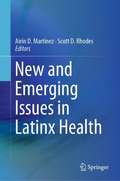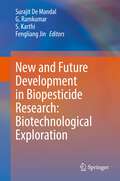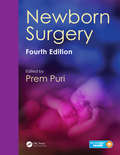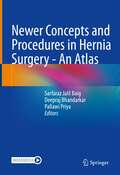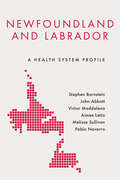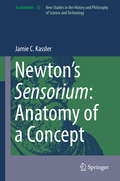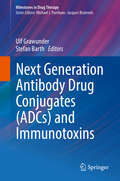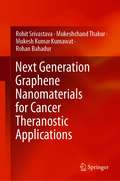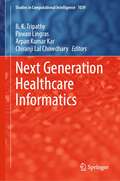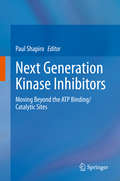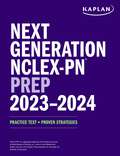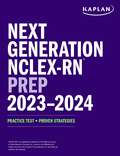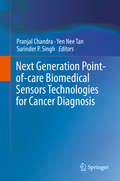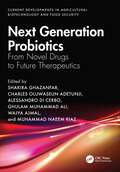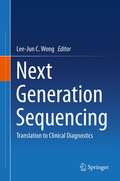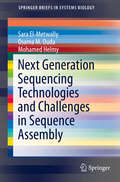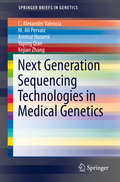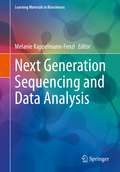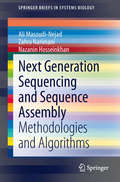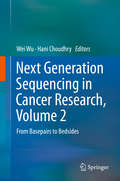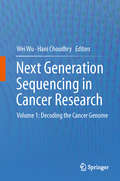- Table View
- List View
New York Nights with Mr. Right (Sexy Surgeons in the City)
by Tina BeckettIn the second installment of the Sexy Surgeons in the City duet, one heartbroken surgeon&’s fresh start heats up when she meets the sexy reformed rebel surgeon she&’ll be working with… UP ALL NIGHT…IN THE CITY THAT NEVER SLEEPS! Lucy needs a distraction from heartbreak—stat! The physical therapist hopes that joining a specialist team at her hospital will be the perfect way to shift her focus. Until Lucy is introduced to surgeon Sam… Now all she finds herself focusing on is her new colleague! But Lucy isn&’t looking for love. And if she was, reformed rebel Sam would not be her Mr. Right. Yet while Lucy is scared of being burned by love, will their red-hot attraction be impossible to resist? From Harlequin Medical: Life and love in the world of modern medicine. Sexy Surgeons in the CityBook 1: Manhattan Marriage Reunion by JC HarrowayBook 2: New York Nights with Mr. Right by Tina Beckett
New and Emerging Entities in Dermatology and Dermatopathology
by Bruce R. Smoller Franco RongiolettiIn recent years new, obscure or poorly known dermatological disorders have been described and better defined, with emphasis on clinical, histopathological and etiopathogenetic features. Familiarity with these new, emerging or revisited clinical entities is fundamental, and recognizing them with their differential diagnosis has important implications in clinical practice for better patient management.This book offers an in-depth discussion of the clinical and pathologic features of newly described or less well-known and revisited cutaneous disorders. It provides clinical findings, as well as the histologic, immunologic, and molecular features of these diseases in addition to therapeutic notes. The first section of the book covers cutaneous diseases that lack any systemic implications, such as circumscribed palmoplantar hypokeratosis, necrotizing infundibular crystalline folliculitis, and dermal hyperneury, amongst others. The second section offers coverage on cutaneous diseases with systemic implications, such as AESOP-POEMS syndrome, lipoatrophic panniculitis of children, and obesity associated with lymphedematous mucinosis. Each chapter describes an entity, along with an atlas of clinical manifestations that will serve as a “bed-side” clinical reference, followed by a series of photomicrographs depicting the histologic changes. Chapters also offer recent updates on molecular tools helpful in attaining the diagnosis as well as therapeutic recommendations based upon the more recent acquisitions. New and Emerging Entities in Dermatology and Dermatopathology is a must-have reference for the practicing dermatopathologist, internists, general pathologist reviewing skin biopsies, general dermatologists, family practitioners and nurse practitioners, geneticists, immunologists and other health care providers that care for patients with skin conditions.
New and Emerging Issues in Latinx Health
by Scott D. Rhodes Airín D. MartínezThis volume is being published at a critical time in U.S. history and serves as a comprehensive and much-needed update to what is known about Latinx health. As both the United States and Latinx subgroups experience demographic shifts, it is critical to examine the current epidemiology of Latinx health, as well as the factors influencing the health and well-being of this growing population.Chapters in this book, written by highly respected experts, illuminate the diversity of the Latinx population and provide strategies to mitigate many of the challenges they face, including challenges related to migrating to new destinations. The book is designed to enrich dialogue around the multilevel determinants of Latinx health and concludes with a call to action for increased culturally congruent, theoretically informed and participatory Latinx health research. The book also encourages the mentorship and growth of early career and junior investigators to conduct research on Latinx health issues.A selection of the perspectives included among the chapters: Chronic disease and mental health issues in Latinx populationsSubstance use among Latinx adolescents in the United StatesPhysical and intellectual and developmental disabilities in Latinx populationsHealth insurance reform and the Latinx populationImmigration enforcement policies and Latinx healthResearch priorities for Latinx sexual and gender minoritiesRacial and ethnic discrimination, intersectionality, acculturation, and Latinx health New and Emerging Issues in Latinx Health is an invaluable compendium that provides a foundation of understanding Latinx health and well-being and guides future research and practice. The book is essential for researchers, practitioners, and students in the fields of public health and the social sciences including community and health psychology, health administration and policy, community health education, medical anthropology, medical sociology, population health, and preventive medicine. Moreover, the chapters in this volume are also relevant for federal, state, and local agencies, including health departments, and other Latinx- and immigrant-serving community organizations.
New and Future Development in Biopesticide Research: Biotechnological Exploration
by Surajit De Mandal Fengliang Jin G. Ramkumar S. KarthiThis book discusses different approaches for successful pest-management through biotechnological interventions. Pest management is directly associated with the agricultural productivity. The book introduces the reader to various kinds of biopesticides that have been developed and are being developed for field application. Chemical pesticides have been widely used to control pests, and these induce pesticide resistance as well as other environmental problems. This book discusses the necessity to develop alternate pest control strategies, especially environment-friendly and target-specific biopesticides against destructive pests. The book describes important aspects such as microbial biopesticides, plant-based biopesticides, natural products that act against pests and the various other biotechnological advances and limitations of these biopesticides. It provides an in-depth knowledge of the latest research and development in the area of biopesticides. This informative book is meant for students and researchers in the fields of biotechnology, agriculture and applied microbiology.
Newborn Surgery: General Principles And Newborn Surgery
by Prem PuriFollowing the success of three previous editions, this new edition of Newborn Surgery continues to provide the most comprehensive information on the surgical management of neonatal disorders. Each chapter is thoroughly revised and updated, and there are eight new chapters on key topics in the specialty, including neonatal care in the delivery room, specific risks for pre-term infants, surgical safety, tissue engineering and stem cell research, and surgical implications of HIV.
Newer Concepts and Procedures in Hernia Surgery - An Atlas
by Pallawi Priya Sarfaraz Jalil Baig Deepraj BhandarkarThe atlas focuses on the surgical steps of the latest hernia surgeries elucidated by labeled pictures. It aims to explain the technical aspects of hernia procedures. It includes images that are both graphic and intraoperative clinical photographs for better understanding. The book is written by international experts who have invented and pioneered the newer hernia procedures. Hernia surgery has evolved at a tremendous pace in the last decade. In the last decade, there has been a proliferation of more than 20 procedures in hernia repair, and they offer advantages compared to the older procedures in various clinical situations. Presently, the resources, including images of the newer procedures, are limited to the published journals. This book aims to fill this gap by providing technique based knowledge in an illustrated manner for learning newer hernia procedures. It is written in a succinct style. The book serves as a ready reference for practicing surgeons, minimal access surgeons and, resident surgeons, fellows.
Newfoundland and Labrador: A Health System Profile (Provincial and Territorial Health System Profiles)
by John Abbott Stephen Bornstein Victor Maddalena Aimee Letto Melissa Sullivan Pablo NavarroThere is not, and has never been, a single Canadian health system. Part of a series on the health systems of Canada’s provinces and territories, Newfoundland and Labrador: A Health System Profile provides a critical analysis of how the single-payer health care system has been implemented in the country’s youngest province. Examining the way the province’s health services are organized, funded, and delivered, the authors focus on the challenges involved in providing effective health care in a setting characterized by a large, decentralized territory; a small population, much of which is widely distributed in a large number of rural communities and small towns; and comparatively limited fiscal capacity and health human resources. Drawing on maps, figures, and collected data, this book documents the hesitant and limited ways in which Newfoundland and Labrador has sought to deal with the challenges and difficulties that the system has experienced in responding to recent changes in demography, economics, and medical technology.
Newton’s Sensorium: Anatomy of a Concept (Archimedes Ser. #53)
by Jamie C. KasslerThese chapters analyze texts from Isaac Newton’s work to shed new light on scientific understanding at his time. Newton used the concept of “sensorium” in writings intended for a public audience, in relation to both humans and God, but even today there is no consensus about the meaning of his term. The literal definition of the Latin term 'sensorium', or its English equivalent 'sensory', is 'thing that feels’ but this is a theoretical construct.The book takes readers on a process of discovery, through inquiry into both Newton’s concept and its underlying model. It begins with the human sensorium. This part of his concept is situated in the context of the aforesaid writings but also in the context of the writings of two of Newton's contemporaries, the physicians William Briggs and Thomas Willis, both of whom were at the forefront of their respective specialties of ophthalmology and neurology. Only once the human sensorium has been explored is it possible to generalize to the unobservable divine sensorium, because Newton's method of reasoning from experience requires that the second part of his concept is last in the order of knowledge. And the reason for this sequence is that his method, the short-hand term for which is 'analogy of nature', proceeds from that which has been observed to be universally true to that which is beyond the limits of observation. Consequently, generalization passes insensibly into reasoning by analogy.Readers will see how certain widespread assumptions can be called into question, such as that Newton was a theological voluntarist for whom the will is superior to the intellect, or that, for Newton, not only the world or universe but also God occupies the whole extent of infinite space. The insights afforded through this book will appeal to scholars of the philosophy of science, human physiology, philosophy of mind and epistemology, among others.
Next Generation Antibody Drug Conjugates (ADCs) and Immunotoxins
by Ulf Grawunder Stefan BarthThis book describes the newest developments in antibody drug conjugates and immunotoxins, paving their way to clinical application. Lessons learned from the current state of the art are used to further improve our understanding of their mechanisms of action and off target activities. The book introduces scientists to all of the prerequisites that must be properly addressed, including identification of the right target, specific traits of target binding antibodies, proper selection of the toxic payload, internalization induced by binding, and next generation conjugation and linker technologies. These knowledge-based, revolutionary new drug principles will form the cornerstone of the future standard of care and will lead to major advances in application, as well as improved quality of life and patient survival rates. This book will be of interest to biotech companies and researchers working in the fields of immunology, pharmacology, and oncology.
Next Generation Antidepressants
by Stephen M. Stahl Chad E. BeyerThe World Health Organization defines depression as a primary contributor to the global burden of disease and predicts it will become the second leading cause of death by 2020. The need to develop effective therapies has never been so pressing. Current antidepressant drugs have several limitations. This 2010 book looks at the future of mood-disorder research, covering the identification of new therapeutic targets, establishing new preclinical models, new medicinal chemistry opportunities, and fostering greater understanding of genetic influences. These strategies are likely to help build a better picture of the disease process, and lead to new opportunities for patient stratification and treatment. The ultimate goal for this strand of research is to develop more personalized and effective treatments for this chronic and debilitating condition. This is essential reading for all those involved in psychopharmacologic drug development, and mental health clinicians seeking a preview of discoveries soon to influence their practice.
Next Generation Graphene Nanomaterials for Cancer Theranostic Applications
by Rohit Srivastava Mukeshchand Thakur Mukesh Kumar Kumawat Rohan BahadurThis book focuses on the use of graphene and its derivatives for application in cancer diagnosis and therapy. Readers are introduced to graphene nanomaterial history, synthesis procedures, properties, modifications, and applications in cancer research and development. The wide-ranging properties of graphene nanomaterials can be utilized for various cancer therapeutic and diagnostic applications. The contents discuss these applications with simple graphical overviews and provide comprehensive detail for a better understanding of the state of the art. The book will be of interest to professionals and academic researchers alike.
Next Generation Healthcare Informatics (Studies in Computational Intelligence #1039)
by Pawan Lingras Arpan Kumar Kar B. K. Tripathy Chiranji Lal ChowdharyThis edited book provides information on emerging fields of next-generation healthcare informatics with a special emphasis on emerging developments and applications of artificial intelligence, deep learning techniques, computational intelligence methods, Internet of medical things (IoMT), optimization techniques, decision making, nanomedicine, and cloud computing. The book provides a conceptual framework and roadmap for decision-makers for this transformation. The chapters involved in this book cover challenges and opportunities for diabetic retinopathy detection based on deep learning applications, deep learning accelerators in IoT and IoMT, health data analysis, deep reinforcement-based conversational AI agent in healthcare systems, examination of health data performance, multisource data in intelligent medicine, application of genetic algorithms in health care, mental disorder, digital healthcare system with big data analytics, encryption methods in healthcare data security, computation and cognitive bias in healthcare intelligence and pharmacogenomics, guided imagery therapy, cancer detection and prediction techniques, medical image processing for coronavirus, and imbalance learning in health care.
Next Generation Kinase Inhibitors: Moving Beyond the ATP Binding/Catalytic Sites
by Paul ShapiroProtein kinases are fascinating enzymes that maintain the proper function of nearly every task performed by the cells of the human body. By extracting a phosphate from the energy molecule ATP and linking it to another protein, protein kinases alter the structure and ultimate function of other proteins. In this way, protein kinases help monitor the extracellular environment and integrate signaling cues that, for the most part, are beneficial for human health and survival. However, protein kinases are often dysregulated and responsible for the initiation and progression of many types of cancers, inflammatory disorders, and other diseases. Thus, decades of research have revealed much about how protein kinases are regulated and approaches to inhibit these enzymes to treat disease. However, nearly 30 years since the identification of the first clinically beneficial small molecule protein kinase inhibitor, there are only a few examples where these drugs provide sustained and durable patient responses. The goal of this book is to provide biomedical scientists, graduate, and professional degree students insight into different approaches using small molecules to block specific protein kinase functions that promote disease.
Next Generation NCLEX-PN Prep 2023-2024: Practice Test + Proven Strategies (Kaplan Test Prep)
by Kaplan NursingThe NCLEX-PN exam is not just about what you know—it&’s about how you think. With expert critical thinking strategies and targeted practice, Kaplan&’s Next Generation NCLEX-PN Prep 2023-2024 will help you leverage your nursing knowledge and face the exam with confidence. Fully revised for the April 2023 test change, this edition scrutinizes the Next Generation NCLEX question types and spells out how to answer each.We're so confident that Next Generation NCLEX-PN Prep offers the guidance you need that we guarantee it: After studying with our book, you'll pass the test—or your money back.Proven Strategies. Realistic Practice.9 critical thinking pathways to break down what NCLEX-PN questions are asking6 end-of-chapter practice sets to help you put critical thinking principles into actionStep-by-step guidance for tackling every question type on the Next Generation NCLEX-PN, including Matrix, Multiple Response, Cloze, Drag-and-Drop, Highlight, Bowtie, and TrendFull-length practice test to gauge your progressInstructions to access Kaplan&’s NCLEX-PN online quizzes—representing all 8 NCLEX client needs categories, plus a "question of the day"—FREE!Detailed rationales for all answer choices, correct and incorrectExpert GuidanceCapsule content review, organized along the exam's "Client Needs" frameworkPractice questions and study materials validated by Kaplan's learning engineers and expert psychometriciansWe invented test prep—Kaplan (www.kaptest.com) has been helping students for 80 years, and our proven strategies have helped legions of students achieve their dreams
Next Generation NCLEX-RN Prep 2023-2024: Practice Test + Proven Strategies (Kaplan Test Prep)
by Kaplan NursingThe NCLEX-RN exam is not just about what you know—it&’s about how you think. With expert critical thinking strategies and targeted practice, Kaplan&’s Next Generation NCLEX-RN Prep 2023-2024 will help you leverage your nursing knowledge and face the exam with confidence. Fully revised for the April 2023 test change, this edition scrutinizes the Next Generation NCLEX question types and spells out how to answer each.We're so confident that Next Generation NCLEX-RN Prep offers the guidance you need that we guarantee it: After studying with our book, you'll pass the test—or your money back.Proven Strategies. Realistic Practice.10 critical thinking pathways to break down what NCLEX-RN questions are asking8 end-of-chapter practice sets to help you put critical thinking principles into actionStep-by-step guidance for tackling every question type on the Next Generation NCLEX-RN, including Matrix, Multiple Response, Cloze, Drag-and-Drop, Highlight, Bowtie, and TrendFull-length practice test to gauge your progressInstructions to access Kaplan&’s full-length NCLEX-RN computerized test—representing all 8 NCLEX client needs categories—FREE!Detailed rationales for all answer choices, correct and incorrectExpert GuidanceCapsule content review, organized along the exam's "Client Needs" frameworkPractice questions and study materials validated by Kaplan's learning engineers and expert psychometriciansWe invented test prep—Kaplan (www.kaptest.com) has been helping students for 80 years, and our proven strategies have helped legions of students achieve their dreams
Next Generation Point-of-care Biomedical Sensors Technologies for Cancer Diagnosis
by Pranjal Chandra Yen Nee Tan Surinder P. SinghThis book presents recent research on cancer detection methods based on nanobiosensors, which offer ultrasensitive point-of-care diagnosis. Several methods for diagnosing cancer have been discovered and many more are currently being developed. Conventional clinical approaches to detecting cancers are based on a biopsy followed by histopathology, or on the use of biomarkers (protein levels or nucleic acid content). Biopsy is the most widely used technique; however, it is an invasive technique and is not always applicable. Furthermore, biomarker-based detection cannot be relied on when the biomarkers are present in an extremely low concentration in the body fluids and in malignant tissues. Thus, in recent years highly sensitive and robust new cancer diagnosis techniques have been developed for clinical application, and may offer an alternative strategy for cancer diagnosis. As such, this book gathers the latest point-of-care cancer diagnostic methods and protocols based on biomedical sensors, microfluidics, and integrated systems engineering. It also discusses recent developments and diagnostics tests that can be conducted outside the laboratory in remote areas. These technologies include electrochemical sensors, paper-based microfluidics, and other kit-based diagnostic methods that can be adapted to bring cancer detection and diagnostics to more remote settings around the globe. Overall, the book provides students, researchers, and clinicians alike a comprehensive overview of interdisciplinary approaches to cancer diagnosis.
Next Generation Probiotics: From Novel Drugs to Future Therapeutics (Current Developments in Agricultural Biotechnology and Food Security)
by Charles Oluwaseun Adetunji Ghazanfar Shakira Alessandro Di Cerbo Ghulam Muhammad Ali Wajya Ajmal Muhammad Naeem RiazNext Generation Probiotics: From Novel Drugs to Future Therapeutics provides a comprehensive and cutting-edge exploration of probiotics as powerful therapeutic agents. With the rapid advancements in the field, this book offers a deep dive into how probiotics are evolving beyond traditional uses, addressing complex health conditions and diseases in modern medicine. By combining the latest scientific research with practical applications, this book equips researchers, clinicians, and healthcare professionals with the knowledge needed to incorporate probiotics into clinical practice and future therapeutic strategies.The book covers a wide range of essential topics, including: Probiotic mechanisms and the chemical characterization of bioactive compounds derived from probiotics The emerging role of probiotics in gut-brain interactions and psychobiotics for mental health Probiotic-based drug development and their applications in personalized medicine Probiotics in the prevention and treatment of gastrointestinal disorders, metabolic diseases, and cancer The integration of next-generation sequencing and machine learning in optimizing probiotic therapies Probiotics in functional foods and their potential to alleviate lactose intolerance Applications in animal health, focusing on terrestrial and aquatic animals This book stands out by offering an exhaustive examination of probiotics in therapeutic applications, providing real-world examples and insights into how these microorganisms are reshaping modern medicine. Next Generation Probiotics is a must-read for researchers, clinicians, and healthcare professionals interested in the future of probiotics as a therapeutic tool for a wide range of health challenges.
Next Generation Sequencing
by Lee-Jun C. WongIn recent years, owing to the fast development of a variety of sequencing technologies in the post human genome project era, sequencing analysis of a group of target genes, entire protein coding regions of the human genome, and the whole human genome has become a reality. Next Generation Sequencing (NGS) or Massively Parallel Sequencing (MPS) technologies offers a way to screen for mutations in many different genes in a cost and time efficient manner by deep coverage of the target sequences. This novel technology has now been applied to clinical diagnosis of Mendelian disorders of well characterized or undefined diseases, discovery of new disease genes, noninvasive prenatal diagnosis using maternal blood, and population based carrier testing of severe autosomal recessive disorders. This book covers topics of these applications, including potential limitations and expanded application in the future.
Next Generation Sequencing Technologies and Challenges in Sequence Assembly
by Sara El-Metwally Osama M. Ouda Mohamed HelmyThe introduction of Next Generation Sequencing (NGS) technologies resulted in a major transformation in the way scientists extract genetic information from biological systems, revealing limitless insight about the genome, transcriptome and epigenome of any species. However, with NGS, came its own challenges that require continuous development in the sequencing technologies and bioinformatics analysis of the resultant raw data and assembly of the full length genome and transcriptome. Such developments lead to outstanding improvements of the performance and coverage of sequencing and improved quality for the assembled sequences, nevertheless, challenges such as sequencing errors, expensive processing and memory usage for assembly and sequencer specific errors remains major challenges in the field. This book aims to provide brief overviews the NGS field with special focus on the challenges facing the NGS field, including information on different experimental platforms, assembly algorithms and software tools, assembly error correction approaches and the correlated challenges.
Next Generation Sequencing Technologies in Medical Genetics
by C. Alexander Valencia M. Ali Pervaiz Ammar Husami Yaping Qian Kejian ZhangThis book introduces readers to Next Generation Sequencing applications in medical genetics. The authors discuss the direct application of next-generation sequencing to medicine, specifically, laboratory medicine or molecular diagnostics. The first part of the book contains chapters on sanger sequencing, NGS technologies, targeted-amplification and capture, and exome sequencing. The second part of the book focuses on genetic disorders diagnoses by NGS, prenatal diagnosis, muscular dystrophies, mitochondrial disorders diagnosis, and challenges in molecular diagnosis. Recent developments and potential future trends in NGS sequencing applications are highlighted, as well.
Next Generation Sequencing and Data Analysis (Learning Materials in Biosciences)
by Melanie Kappelmann-FenzlThis textbook provides step-by-step protocols and detailed explanations for RNA Sequencing, ChIP-Sequencing and Epigenetic Sequencing applications. The reader learns how to perform Next Generation Sequencing data analysis, how to interpret and visualize the data, and acquires knowledge on the statistical background of the used software tools. Written for biomedical scientists and medical students, this textbook enables the end user to perform and comprehend various Next Generation Sequencing applications and their analytics without prior understanding in bioinformatics or computer sciences.
Next Generation Sequencing and Sequence Assembly: Methodologies and Algorithms
by Ali Masoudi-Nejad Zahra Narimani Nazanin HosseinkhanThe goal of this book is to introduce the biological and technical aspects of next generation sequencing methods, as well as algorithms to assemble these sequences into whole genomes. The book is organized into two parts; part 1 introduces NGS methods and part 2 reviews assembly algorithms and gives a good insight to these methods for readers new to the field. Gathering information, about sequencing and assembly methods together, helps both biologists and computer scientists to get a clear idea about the field. Chapters will include information about new sequencing technologies such as ChIp-seq, ChIp-chip, and De Novo sequence assembly.
Next Generation Sequencing in Cancer Research, Volume 2
by Wei Wu Hani ChoudhryLatest generation sequencing revolutionizes the fields of cancer research and oncology. This follow-up volume focuses more extensively on single cell sequencing of cancer and trials in drug resistance. Another exciting feature is the bioinformatics tools given, that can be used on cancer genome studies. Scientists around the world are attempting to find the root cause of cancer. A reasonable cancer treatment plan and potential cure is more optimistic now with the unfolding of the cancer genome. The collective knowledge of how to leverage next generation sequencing in cancer research is paving the way. The important information provided in this volume will move the field forward in developing novel targeted cancer therapies.
Next Generation Sequencing in Cancer Research: Decoding the Cancer Genome
by Wei Wu Hani ChoudhryThis volume provides an interdisciplinary perspective of applying Next Generation Sequencing (NGS) technology to cancer research. It aims to systematically introduce the concept of NGS, a variety of NGS platforms and their practical implications in cancer biology.This unique and comprehensive text will integrate the unprecedented NGS technology into various cancer research projects as opposed to most books which offer a detailed description of the technology. This volume will present true experimental results with concrete data processing pipelines, discuss the bottleneck of each platform for real project in cancer research. In additional, single cancer cell sequencing as the proof of concept will be introduced in this book, along with cutting-edge information provided will help the intended audience to develop a comprehensive understanding of the NGS technology and practical whole genome sequencing data analysis and rapidly translate into their own research, specifically in the field of cancer biology.
Next Generation Smart Nano-Bio-Devices (Smart Innovation, Systems and Technologies #322)
by Arindam Biswas Gorachand DuttaThis book addresses challenges for the development of a point-of-care-test platform. The book describes printed chip-based assay (Lab-on-a-Chip, Lab-on-a-PCB) for rapid, inexpensive biomarkers detection in real samples. The main challenges of point-of-care testing require implementing complex analytical methods into low-cost technologies. This is particularly true for countries with less developed healthcare infrastructure. Washing-free, Lab-on-Chip, and Lab-on-PCB techniques are very simple and innovative for point-of-care device development. The redox cycling technology detects several interesting targets at the same time on a printed chip. The proposed areas are inherently cross-disciplinary, combining expertise in biosensing, electrochemistry, electronics and electrical engineering, health care, and manufacturing. This book focuses on recent advances and different research issues in the nanobiotechnology-enabled biosensor technology and also seeks out theoretical, methodological, well-established, and validated empirical work dealing with these different topics.


